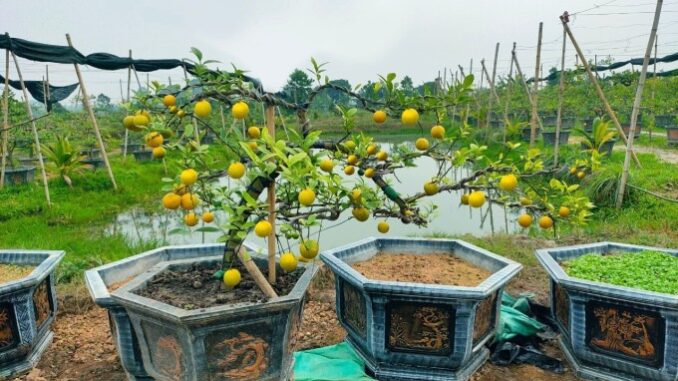
HAI PHONG – After 5 years of pursuit, Tuan Anh, 36 years old, successfully grafted a four-quarter lemon variety onto a grapefruit root, bent it into a bonsai shape, and plans to sell the tree during Tet 2024.
Nguyen Tuan Anh’s four-precious lemon garden is located among abandoned fields in Ngoi field, Thuan Thien commune, Kien Thuy district. In the garden, a group of workers watered, weeded, and bent branches to shape the lemon trees, which were juicy but still green.
Before starting his business with four precious lemon trees, Mr. Tuan Anh spent 7 years working as a tour guide. Going to many rural areas, he saw that motorbike repairmen lacked professional tools, so repairs took a long time. Being interested in mechanics, he researched and created a tire removal machine. The product was selling well, so he decided to quit traveling and switch to mechanical engineering.
While settling into a new career, in 2018, he suddenly told his family to invest on a large scale in agriculture. “The whole family was surprised because the mechanical engineering job was giving me a good income, but returning to farming was hard and took many risks. Actually, I just wanted to take advantage of the abandoned land in my hometown,” Tuan Anh explained. His hometown was low-lying, full of rats, and ineffective rice cultivation, so it was abandoned for many years.

After many days of researching agricultural models and seedlings, Mr. Tuan Anh decided to choose four-quarter lemon. “Not only eating fruit, in feng shui lemon trees also help eliminate bad energy sources, bring positive energy, and bring luck to the homeowner, so they can be grown as ornamental plants,” he said.
He hired someone to renovate three acres of his family’s fields and then went to Hung Yen to import 5,000 four-quarter lemon seedlings. The plant originates from the Americas, produces fruit all year round, has a sour, succulent taste. When ripe, the fruit is bright yellow, suitable for ornamental purposes.
Garden owners divide seedlings into two types. 3,000 trees planted to harvest fruit, leaves and create seedlings later. The remainder are grafted onto grapefruit roots to create stronger, easier-to-create bonsai trees, sold during Tet at high prices.
In order for lemons to have ripe yellow fruit, green fruit, flowers and leaves for Tet, Mr. Tuan Anh must calculate the time to prune branches and turn leaves. The first batch of fruit comes out in the second lunar month and will ripen after 8 months. Mid-year is when the bonsai lemon tree produces its second round of fruit, and the fruit is still green when sold. After celebrating Tet, lemon trees only need to be watered and periodically fertilized with microbiological fertilizers to continue to grow and produce fruit for year-round use.
Tuan Anh only uses biological fertilizers, composted manure, and soaked soybeans instead of chemical nitrogen fertilizers. The automatic watering system is designed to each tree root to help the lemon garden stay healthy and beautiful. “This method makes the cost and care cost high, but the tree is durable and strong, and players can eat the fruits and leaves without having to worry,” he explained.
After two years of creating the embryo, he put the lemon tree in a pot and bent it. Lemon branches break easily and have many thorns. He and his family couldn’t bend it themselves, and hundreds of seedlings were damaged, so they had to invite a specialist to help them, accepting the high cost. Every year, a group of Nam Dinh workers will come out twice to bend and correct the shape of the tree, each time two months, the salary is 700,000 VND per person per day.

Bonsai lemons take 4-5 years to sell, while all of Mr. Tuan Anh’s accumulated assets from his mechanical profession and several billions of bank loans are invested in the lemon garden. “Taking care of the garden is hard, and without making any money, I wanted to give up no less than 10 times. Fortunately, my family and friends have often encouraged and supported me,” he shared. Currently, he still works as a tire remover to earn income and cover the cost of growing lemons.
The lemon garden has now been expanded to 10 acres with 2,000 potted bonsai trees, ready for the Tet season. The garden owner is building more promotional channels on Youtube and other social platforms to let customers know about this new product.
Leaders of Thuan Thien Commune People’s Committee assessed that growing bonsai lemons is a new model, unique in Kien Thuy district, with great potential for development. This model takes advantage of abandoned land, so it receives attention and policy loan support from all levels.
($1=24,000 VND)
Photo,Video: Internet (Vinlove.net)
